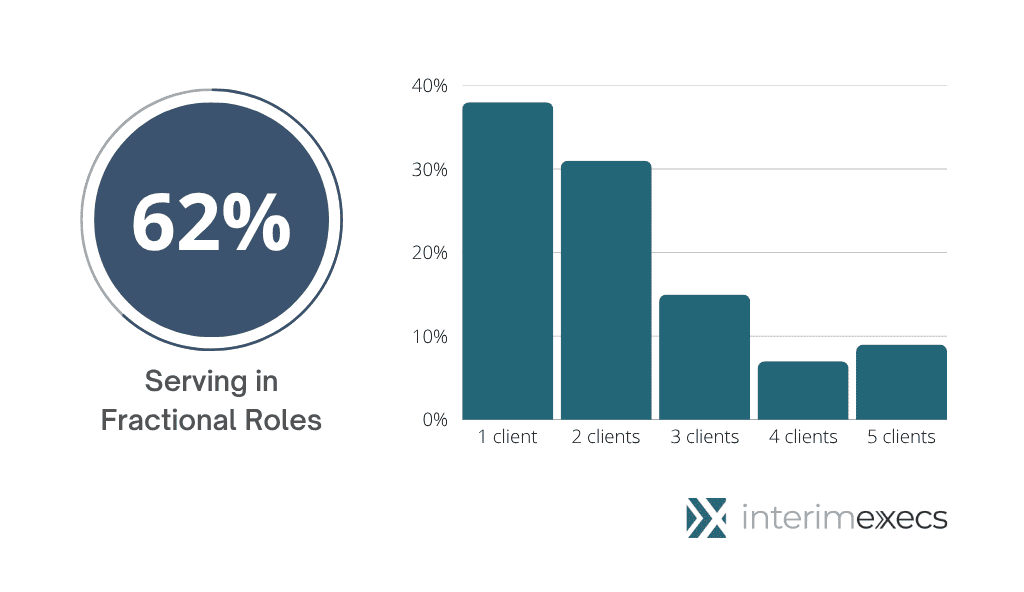Fractional executives — including fractional CEOs, CFOs, COOs, and CIOs — are the hottest thing in the C-suite. What started as a niche workaround has gone mainstream, with companies from fast-scaling startups to Fortune 500s tapping part-time leaders for big-impact roles.
These aren’t consultants or advisors — they’re deeply embedded executives, delivering high-level strategy, leadership, and results without the cost or commitment of a full-time hire.
But what exactly is a fractional executive? How is this different from an interim or outsourced solution? And when does it make sense to go fractional in the first place?
In this article, we’ll break down:
✅ What a fractional executive actually is (and isn’t)
✅ The roles most often filled fractionally — including CEO, CFO, COO, and more
✅ The benefits to fractional leadership vs. interim or full-time
✅ What types of companies bring on fractional leadership
Plus: insights from InterimExecs CEO Robert Jordan on what companies get right — and wrong — when they go fractional.
Watch the webinar below for a quick hit of real-world examples and lessons from the frontlines of fractional leadership — then scroll on for the full breakdown.
First, the definition.
What is a Fractional Executive?
In short, a fractional executive is an experienced C-suite executive — CEO, CFO, CIO, COO, CSO, CTO, or CMO — who works less than full-time. The fractional executive may be on the job a few hours each day or a few days each week, often working for two or more companies at the same time.
“Fractional executive work has become its own career calling,” says InterimExecs CEO Robert Jordan. “These leaders are not ‘between jobs.’ They love doing fractional work.”

“Executives who excel at this have a strong repeat track record of success. If not, it would be a hard career to sustain,” he said. “Fractional executives are driven to take on new challenges, drive for results, and focus on building, growing, and transforming businesses.”
That’s especially true in high-impact roles like fractional CEO and fractional CFO, where companies need leadership that can quickly set direction, restore confidence, and drive results without delay.
What Are the Benefits of Hiring a Fractional Executive?
There are many benefits of hiring a fractional executive rather than a full-time employee, including:
Reduced cost
Fractional executives typically charge a monthly or project-based fee. That can be a fraction of the cost of hiring a full-time executive with similar experience, who will expect a big paycheck along with other perks of the job, from health insurance to stock options to severance pay. And since there is no employer-employee relationship with fractional executives, there’s less overhead and commitment.
More Flexibility
You can bring on fractional leaders as needed, for a single project, a period of transition, or ongoing part-time support. Their terms are highly adaptable, whether the engagement lasts a few days or several years. Think an as-needed basis so companies can adjust their staffing levels based on workload and budget.
Access to a Bigger Talent Pool
The best fractional execs aren’t looking for full-time jobs. Fractional executives who are part of InterimExecs RED Team are highly experienced, high performing executives who choose this path because they love the variety and impact.
As Jordan says, business leaders have “more tools in their tool box now than ever before.” Like a baseball manager who will bring in a new pitcher mid-game, a business leader can bring in new leadership as needed.
“The nature of business is such that thee are stages and cycles and things that happen for all of us. Now, there is more possibility for everyone to put someone new into the game,” he said.
Lower Risk of a Bad Hire
Because fractional executives are typically hired on a short-term or project-based contracts, companies can evaluate performance without a long-term commitment. If it’s not a fit, it’s easy to make a change.
Specialized Skills When You Need Them Most
Going through a transition? Launching a new market? Planning for an IPO? Fractional executives bring niche expertise and specialized skills exactly when you need it.
Jordan recalls one European tech firm that tapped a RED Team fractional CEO who had taken two companies from zero to $100 million+. It was a cost-effective and powerful way for the European company to enter the US market.
Which Companies Can Benefit Most from Hiring Fractional Executives?
While any company could benefit from the experience of a vetted C-suite executive, there are some situations where a part-time leader, from fractional COO to fractional CIO, is a smarter, more strategic choice than a full-time hire.
Early Stage Start-Ups
Founders often need C-suite-level guidance but can’t always find room in the budget to afford or justify full-time salaries. Fractional leadership lets them tap proven talent affordably, even bringing in more than one exec at once. It’s also an easy way to discover what leadership skills are needed as the company scales to the next level. Fractional leaders often put the infrastructure in place for future growth.
The fractional executives placed by InterimExecs are vetted and experienced leaders, many of whom have taken other start-ups to the next level.
Small Businesses in Transition
Whether the owner or team is strapped for time or resources to get big initiatives accomplished, or some type of transition, succession, or M&A event is in the future, having outside leadership can make a big impact in a short period of time. Fractional executives fill leadership gaps, mentor the next generation and provide owners with breathing room.
Example: A fractional COO can handle day-to-day ops, a fractional CFO can prep financials that support an owner’s growth plans, or a fractional CMO can focus on branding and new product development.
Medium-Sized Businesses in Search of Growth
Navigating strategic transitions. Entering new markets. Developing new products. Fending off market interrupters. Launching an IPO. Seeking investors. Those are all critical passages for companies during which specific expertise can mean the difference between success and failure.
Companies exploring investor or IPO options likely need the higher-level financial skills a fractional Chief Financial Officer can bring. Entering new markets or developing new products to fuel the company’s growth could require the expertise of a fractional Chief Marketing Officer. A fractional Chief Operating Officer could be key to optimizing production processes.
Example: A fractional CFO can manage investor relationships, a fractional COO can put more systems and processes in place, or a fractional CIO can implement new technology to support a streamlined operation.
Large Companies in Need of a Fresh Perspective
Big, successful companies aren’t immune to leadership gaps, market challenges or lagging profitability. Engaging an experienced leader on a part-time basis is an affordable and flexible way to get the company through those challenges.
Example: A fractional CTO can fast-track digital transformation. A fractional COO can establish a new manufacturing facility. A fractional CFO or CIO can help lead an ERP implementation.
Are You Ready for Fractional Leadership?
Whether you’re navigating growth, facing a leadership gap, or preparing for a major transition, a fractional executive may be the smartest move your company can make.
Contact InterimExecs to explore how a part-time or fractional executive from InterimExecs RED Team can help solve your biggest challenges, affordably and fast.
Read More:






